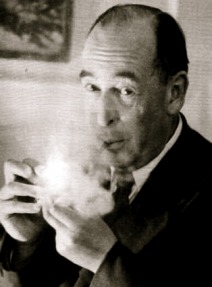Satire
writing that seeks to arouse a reader’s disapproval of an object by ridicule. Satire is usually comedy that exposes errors with an eye to correct vice and folly. Satire is often found in the poetry of Alexander Pope.
The Ass
C. S. Lewis
I woke and rose and slipt away
To the heathery hills in the morning grey.
In a field where the dew lay cold and deep
I met an ass, new-roused from sleep.
I stroked his nose and I tickled his ears,
And spoke soft words to quiet his fears.
His eyes stared into the eyes of me
And he kissed my hands of his courtesy.
“O big, brown brother out of the waste,
How do thistles for breakfast taste?
“And do you rejoice in the dawn divine
With a heart that is glad no less than mine?
“For, brother, the depth of your gentle eyes
Is strange and mystic as the skies:
“What are the thoughts that grope behind,
Down in the mist of a donkey mind?
“Can it be true, as the wise men tell,
That you are a mask of God as well,
“And, as in us, so in you no less
Speaks the eternal Loveliness,
“And words of the lips that all things know
Among the thoughts of a donkey go?
“However it be, O four-foot brother,
Fair to-day is the earth, our mother.
“God send you peace and delight thereof,
And all green meat of the waste you love,
“And guard you well from violent men
Who’d put you back in the shafts again.”
But the ass had far too wise a head
To answer one of the things I said,
So he twitched his fair ears up and down
And turned to nuzzle his shoulder brown.
C.S. Lewis wrote a satire, “The Ass”, about ridiculing a donkey and mocking its intelligence. He calls the donkey a “big, brown brother [from] out of the waster”. He then asks “how do the thistles for breakfast taste?” Both of these lines make fun of the rough conditions donkeys live in, while humans live in luxury. “But the ass had far too wise a head to answer one of the things I said, so he twitched his fair ears up and down and turned to nuzzle his shoulder brown.” These last four lines ridicule the donkey’s intelligence by saying he’s “too wise” to answer the narrator’s question, when in reality a donkey doesn’t know what a human being says.

"An explanation of cause is not a justification by reason." ~C. S. Lewis
C. S. Lewis

Lewis was an author, a scholar of English literature and a famous Christian apologist. The son of a lawyer, Lewis grew up in Ireland at a time when northern Ireland was not torn by the bitter strife which would eventually come to characterize its religious situation. Early on he developed a love for reading and learning. He rejected Christianity at an early age, deciding that Christian myths were inferior to others in the world and that the Christian god, if it existed, must be a sadist.
After a year of study at University College in Oxford, C.S. Lewis volunteered for the trenches of France. At first Lewis enjoyed the close camaraderie of the army, but his idealistic beliefs would be shattered by the death and suffering he witnessed. World War I undermined the progressive ideals of many throughout Europe.
Upon his return he received top grades and was elected to an important teaching post at Magdalen College, also at Oxford. He remained at Oxford until 1955, when he accepted a teaching post at Cambridge. C.S. Lewis would later say that he was an atheist during his early years at Oxford, but began to move towards an evangelical flavor of Anglicanism due to his friendship with J.R.R. Tolkien.
His fame as an author came on two fronts. One was his fictional works, the most popular of which are the Chronicles of Narnia, seven books for young people which incorporate Christian themes and doctrines allegorically. The second front of his fame came from books openly written in defense of traditional Christianity. These include the popular The Screwtape Letters, a collection of letters of advice from a demon to his nephew, and the famous book Mere Christianity which began as a series of radio talks in 1941.
The sort of Christianity promoted by Lewis was unreservedly orthodox. He believed that too many church leaders had watered down traditional Christianity in order to accommodate it to the modern, scientific age. Instead practical tips and platitudes, Lewis emphasized orthodox Christian conceptions of sin, redemption, hell, atonement, resurrection, and miracles.
C.S. Lewis doesn't talk down to his audience (his audience of believers — he’s quite nasty to nonbelievers). Instead, he writes for the average person rather than for philosophers and theologians. He was himself a trained academic, but eschewed jargon and complicated arguments in favor a simplified, unadorned prose that was consciously designed to appeal to the average person.
Because of all this, Lewis’ works have become standard reading for Christians in the United States. It also helps that, although an Anglican, Lewis didn’t focus much on church doctrine. His emphasis on a basic sort of Christianity allowed his appeal to spread to adherents of many denominations.
He was quite open about his goal being to get people to accept Christianity without caring about what denomination they entered, but this is problematic. The name of his most famous apologetic work, Mere Christianity, is a misnomer: there is no such thing as "mere" Christianity. Every denomination has doctrines which it insists are vital but which others insist aren’t — or are even false.
One of the consequences of his simple style is that his arguments have extensive flaws in their logic and reasoning. His writings may serve as an introduction to Christian doctrines, but anyone who relies extensively upon them will be ill-served in any serious discussion about Christian theology or religious philosophy.
(http://atheism.about.com/od/cslewisnarnia/a/biography.htm)
